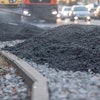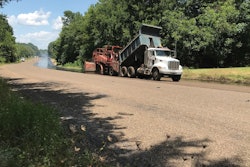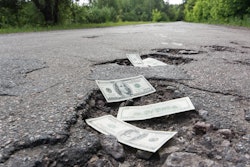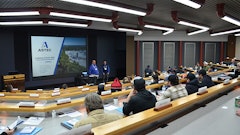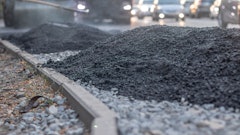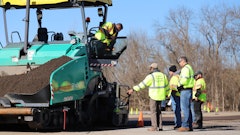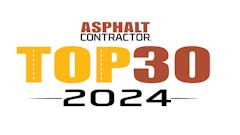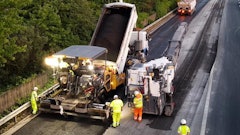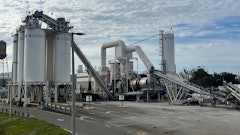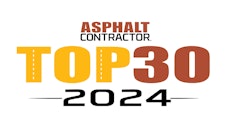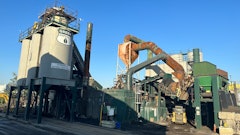![Img 1791[100]](https://img.forconstructionpros.com/files/base/acbm/fcp/image/2022/09/IMG_1791_100_.632c76e4ca400.png?auto=format%2Ccompress&q=70&w=400)
There is an ever present, near constant need to find new and more sustainable answers for the asphalt and paving industry. Advances with reclaimed asphalt pavement allow for old roads and surfaces to be milled up and returned to plants, treated and then reincorporated along with virgin aggregates. That is one solution, and a valuable resource. It does have some drawbacks if you are a smaller contractor who may not have access to the sophisticated sorting required for maximum recycling, or if your primary service needs don't usually call for its use altogether.
An alternative sustainable product is seeing large gains and new growth with new investments into ecologically green markets. Rubber modified asphalt (RMA) is made from used and reclaimed tires, broken down, cleaned, and then ground into "crumb rubber". It isn't treated to undergo any sort of chemical changes, it's just the same rubber. It has seen wide adoption and success in municipalities and areas across thirty-two different states.
Here are some of the primary benefits reported from its use, as researched by the Recycled Rubber Coalition.
1.) Tire Recapture
This benefit doesn't directly impact the contractor, but it is still a relevant factor as the industry continues to push towards a carbon net zero and more sustainable future. Over 300 million used rubber tires are created each year in the United States alone, and close a billion or more globally. As recently as 5 years ago, approximately 96% of these used tires were being recaptured and recycled. The most recent data shows, however, that things are trending in the wrong direction. Current data reveals that only about 76% of used tires are getting reused and kept out of landfills or illegal dumping situations. Rubber modified asphalt (RMA) is one of the best secondary uses available for tire recapture and recycling.
2.) Project Savings
Whether you're repaving a driveway, a shopping mall parking lot, or even a stretch of interstate--everyone is looking for ways to reduce material budgets and lower the overhead on their production. Utilizing RMA in to varying degrees in your asphalt mix has shown to reduce overall project costs between 10% and 40%. Those are significant savings on any project and for any contractor, no matter how big or small they are. For example, on a fifteen mile stretch of road in Bend, OR, the project reported that costs per mile were $70,000 cheaper than with a traditional asphalt resurface.
![Img 2905[56]](https://img.forconstructionpros.com/files/base/acbm/fcp/image/2022/09/16x9/IMG_2905_56_.632c76d1eb5be.png?auto=format%2Ccompress&fit=max&q=70&w=400) Provided by RRC
Provided by RRC
3.) Increased Longevity
In addition to the price tag, every client you do a job for cares about how long the pavement surface is going to hold up. How long will it keep its integrity and its esthetic quality before climate, weather, erosion, traffic and other variable conditions start to break it down. The integration of RMA usage within the asphalt mixes has been shown to extend the average overall lifespan of surfaces by 10%. How is this measured?
There was a study conducted by Recycled Rubber Coalition on asphalt pavement that incorporated RMA in Australia, a part of the world that regularly experiences scenarios of prolonged extreme temperatures. The results found that internal thermal aging was slowed by 50% versus non-RMA surfaces. That's a massive factor when talking with customers about the value of the product they are investing in. However, it was also shown to be more resistant to extreme cold temperatures, as documented in the upper peninsula of Michigan by county engineers.
4.) Driver Benefits
There are, also, several direct benefits and added value to the drivers who will use the RMA surfaces.
- Skid Resistance
- Reduced Tire Wear
- Better Ride Quality (due to smoother contact with surface features)
- Lower Incidence of Damage to Automobiles
- Reduced Road Noise (Up to 10 decibels)
5.) Less Frequent Maintenance
Due to the fact that RMA is more resistant to potholing, cracking and other damages to its surface, the need for frequent maintenance is reduced by up to 20%, as reported by the State of Alabama who utilized the product instead of a tradition, all-asphalt mix. Without having to regularly seek out sealing, patching and other repair works, clients can rest assured that their investment is well-made, first of all. And secondly, they won't have to be as concerned about shelling out thousands more from their already tight budgets to fix the work you've done.
For more information about RMA, it's uses, the science behind it, as well as how you can incorporate it into your business visit: https://recycledrubbercoalition.org




